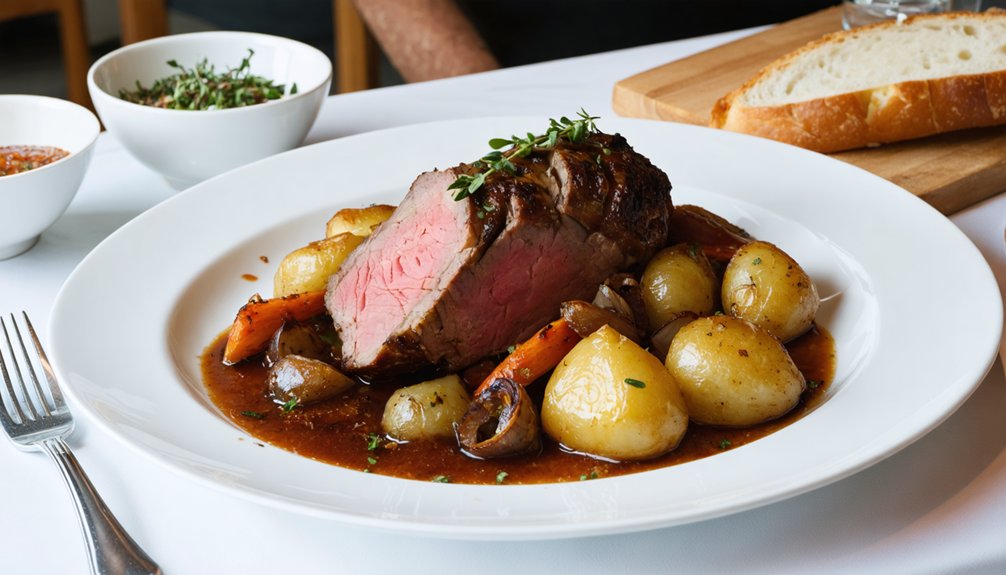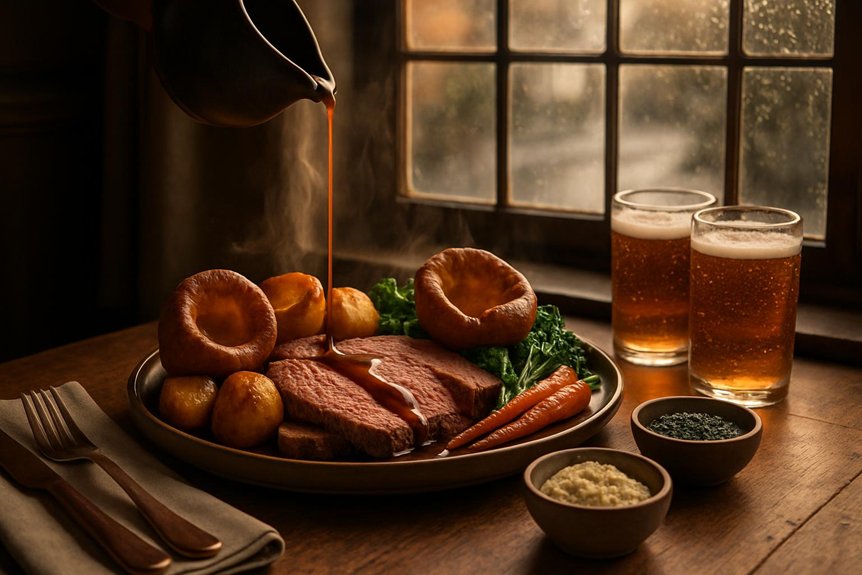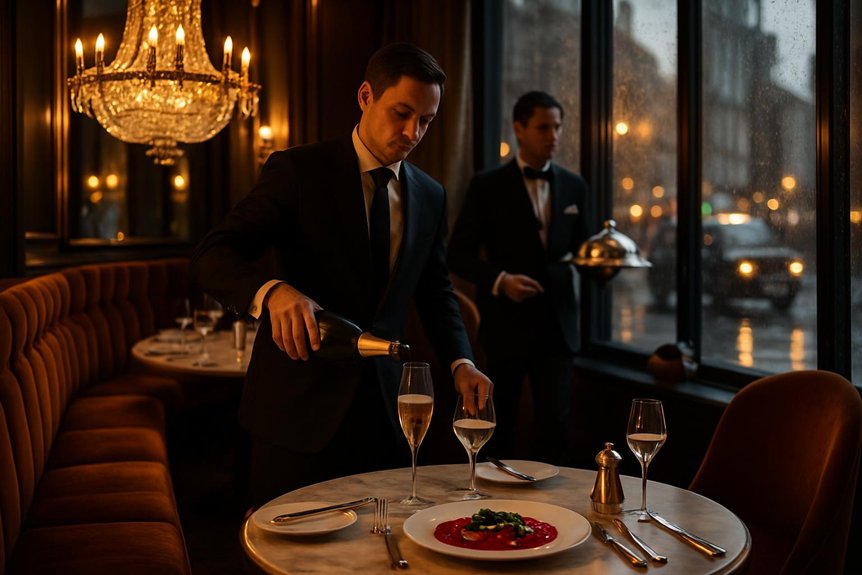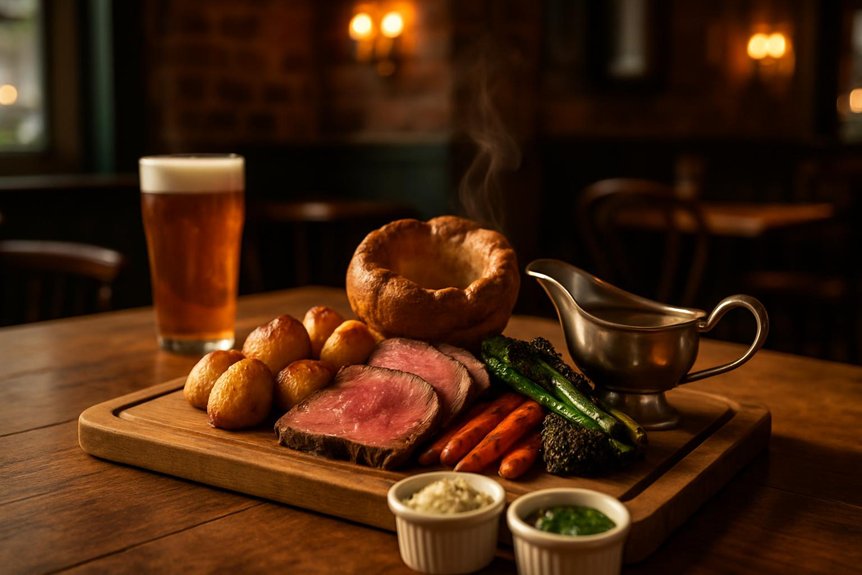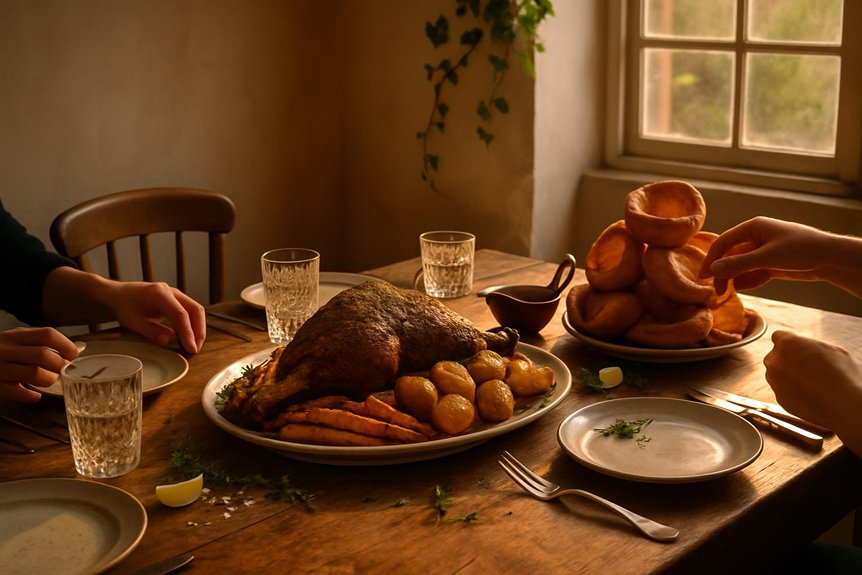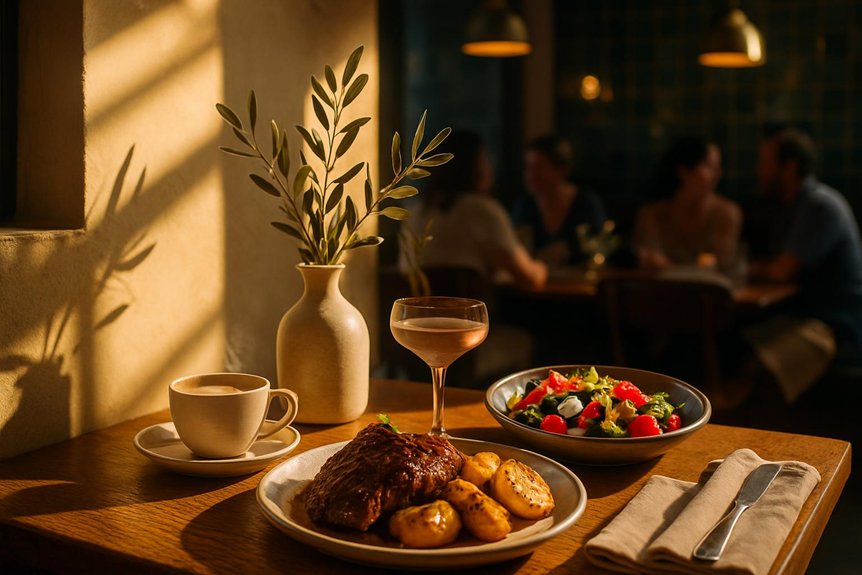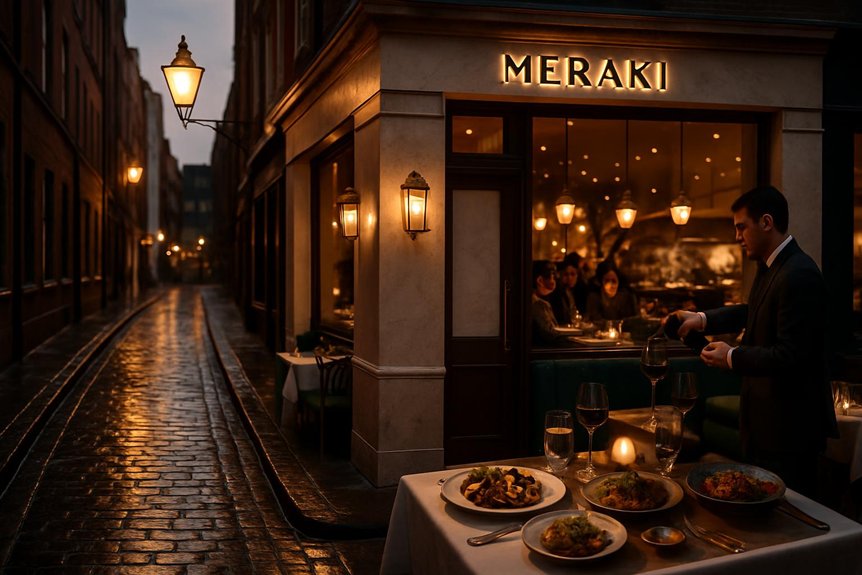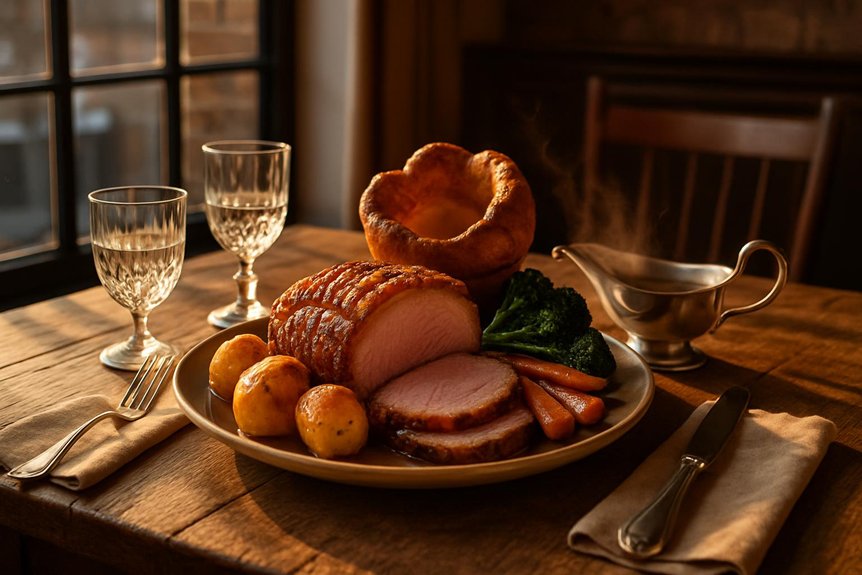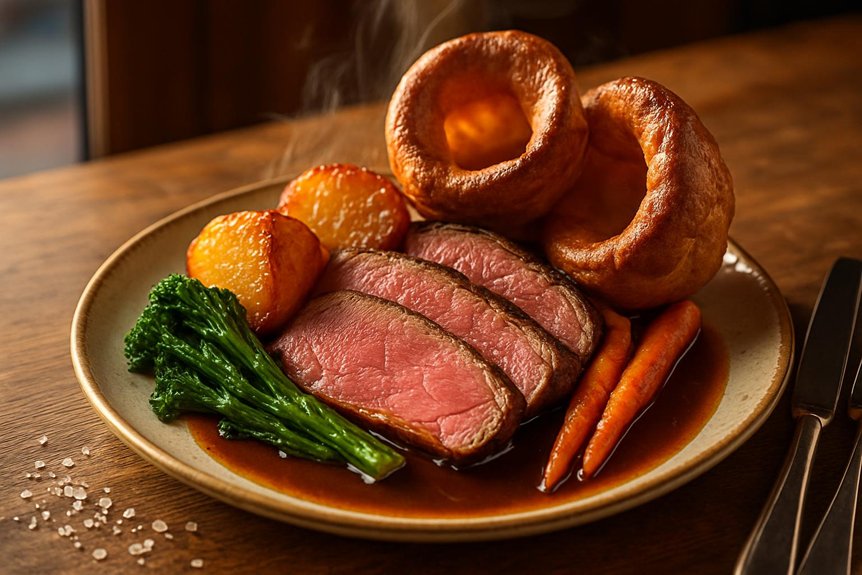Meraki Restaurant in London presents a considered take on the classic Sunday roast. The kitchen focuses on quality ingredients and restrained flavors. Meats are roasted with care; vegetables and sides are straightforward and well executed. Practical details about bookings, dietary options and best times to visit matter as much as the food. There is more to know about portions, value and how to enjoy the meal.
Why Meraki’s Sunday Roast Stands Out
Meraki’s Sunday roast distinguishes itself through meticulous sourcing, expert roasting, and balanced accompaniments that prioritize flavor and texture. The kitchen emphasizes sustainable sourcing, building relationships with local farms to ensure traceability and seasonality. Chefs apply precise roasting techniques that render meats tender while preserving natural juices, and accompaniments are calibrated to complement rather than overpower. Presentation is restrained, highlighting ingredient quality; sauces and gravies are composed to enhance, not mask. Service follows consistent timing so components arrive at optimal temperature. Rotations of chef specials introduce restrained creativity—limited-run dishes that reflect seasonal produce and skillful seasoning. Meraki’s offerings embody British culinary heritage, attracting both locals and tourists for a unique dining adventure.
What’s on the Menu: Meats, Veggies, and Sides
Meraki’s menu balances classic roasts and prime cuts with careful attention to cooking and seasoning. Seasonal vegetables are selected to complement the meats and add color and texture to the plate. A mix of classic and inventive sides ties the meal together, offering familiar comforts and occasional surprises. The Mediterranean cuisine highlights at Meraki are a testament to their dedication to authentic flavors and sustainable ingredient sourcing, ensuring a memorable dining experience.
Roasts and Prime Cuts
A classic Sunday roast centers on well-chosen cuts of meat—typically beef joint, leg of lamb, roast pork with crackling, or a whole roasted chicken—paired with seasonal vegetables and hearty sides like roast potatoes, Yorkshire puddings, and rich gravy.
Each element should be cooked to highlight texture and flavor while balancing richness with bright or acidic accompaniments such as roasted root veg, braised greens, minted peas, or a sharp chutney.
Roasts and prime cuts are defined by meat quality, provenance, and the application of precise cooking techniques: proper resting, controlled roasting temperatures, and finishing sears.
The kitchen selects joints suited to slow or high-heat methods, trims fat to preserve moisture, and times carving to maximize succulence, offering diners reliably tender, flavorful portions.
For an unforgettable dinner experience, consider visiting Meraki Restaurant in London, where dining and dancing blend seamlessly to create a vibrant atmosphere.
Seasonal Veg Selections
After outlining the prime cuts and cooking techniques, the focus shifts to seasonal vegetables that frame and balance the roast. Meraki’s menu highlights seasonal produce chosen for peak flavor and texture: tender new potatoes in spring, roots and brassicas in winter, and charred asparagus or tenderstem in summer.
Preparation emphasizes simplicity—light roasting, steaming, or quick blanching—to preserve freshness and complement richer meats.
Vegetable pairings are carefully considered: sweet roasted carrots with beef, caramelized parsnips alongside pork, and bright, lemoned greens to cut through lamb’s richness. Minimal seasoning and timely cooking maintain contrast between succulent meat and crisp, vibrant veg.
Each plate aims for harmony, letting produce support rather than compete with the main roast.
Classic and Creative Sides
Classic and innovative sides alike define the roast experience, balancing texture, flavor, and seasonality to elevate each plate. Meraki’s approach pairs traditional favorites—crispy roast potatoes, honey-glazed carrots, and buttery Yorkshire puddings—with lighter, herb-forward salads to cut richness.
Sides showcase both comfort and contrast: braised red cabbage for acidity, creamed leeks for silkiness, and charred sprouting broccoli for snap. Inventive new combinations appear regularly, such as rosemary-salted parsnip crisps with truffle aioli or miso-roasted squash alongside sage-infused gravy, offering subtle umami lifts.
Portions are designed for sharing, encouraging diners to mix familiar tastes with experimental accents. Presentation remains unfussy, prioritizing complementary textures and seasonally sourced ingredients that reinforce the roast’s central flavors.
Booking Tips and Best Times to Visit
When planning a Sunday roast, diners should reserve early to secure preferred times and table types, since popular pubs and restaurants often fill quickly between late morning and early afternoon.
Reservations for Meraki Restaurant, London, are best made online or by phone midweek; walk-ins risk long waits.
Aim for a 12:00–13:30 slot to enjoy service at a relaxed pace, or a later 15:00–17:00 seating for quieter dining.
Consider weather tips: check forecasts if opting for outdoor seating and request covered tables when rain or chill is expected.
Note the dress code — smart casual suits most settings but confirm if a special event requires smarter attire.
Cancel or modify bookings timely to avoid penalties and help planning.
Dietary Options and Allergy Information
While many venues pride themselves on traditional roasts, diners should expect clear menu labelling and readily available alternatives for common dietary needs. Most establishments now offer vegetarian, vegan, and gluten‑free options and will note allergens for key components like gravy, stuffing, and sauces.
Meraki Restaurant presents concise allergen information and staff are prepared to outline ingredients and cross‑contact risks. Guests with wheat, dairy, nut, or egg sensitivities are encouraged to notify staff when booking so substitutions can be planned.
The kitchen can adapt plates to include gluten free options and expand vegetarian choices without compromising texture or flavour. Transparency extends to drink pairings and condiments, and written confirmation of adaptations is offered on request to ensure confidence and safety.
How to Make the Most of the Experience
A reader should consider booking at quieter times or reserving early to secure the preferred table and avoid long waits. Attention to timing also helps coordinate starters, sides, and courses so the roast arrives at peak temperature and texture.
Simple enhancements — a recommended wine pairing, sharing a side platter, or asking for freshly carved meat — can elevate the overall experience.
Best Booking Time
The ideal booking time balances peak-hours atmosphere with service quality: late afternoon reservations (around 1–2pm for lunch or 6–7pm for dinner) often secure freshly prepared roasts without the rushed feel of prime Sunday service.
Guests are advised to place a table reservation a few days ahead, particularly for larger parties, to avoid disappointment during peak hours.
Booking earlier than noon can mean quieter service but less lively ambiance; booking too late risks limited menu options or slower turnarounds.
For those seeking a brisk, attentive service, mid-afternoon slots hit the sweet spot.
Parties with dietary requirements should note them when reserving so the kitchen can prepare.
Cancellations should be communicated promptly to free space for other diners.
Enhance Your Meal
Guests can elevate a Sunday roast by focusing on pacing, pairings, and small rituals—savoring starters slowly to preserve appetite, choosing sides and wines that complement rather than compete, and sharing dishes to sample more flavors.
Observing measured courses prevents fullness before the main and encourages conversation. Staff recommendations on wine pairing help match weight and sauce profiles, for example a medium-bodied red with beef or a crisp white for chicken.
Selecting a few contrasting sides—creamy, roasted, and acidic—adds balance without excess. Small rituals, such as toasting or tasting gravy communally, heighten occasion.
Concluding with considered dessert options, whether a light fruit tart or a rich pudding, rounds the meal and leaves a memorable final impression.
Pricing, Portions, and Value for Money
Price should be assessed not only by the menu number but by portion size, quality of ingredients, and included accompaniments. A roast that looks inexpensive on paper can be poor value if meat is skimpy or sides are skimmed.
Meraki’s pricing strategies balance ingredient sourcing and labour, aiming to justify mid-range prices through generous portion sizes and seasonal produce.
Diners gauge value by meat weight, vegetable variety, and extras such as gravy or Yorkshire pudding. Fixed-price options and supplements for premium cuts help clarify expectations.
Transparency on portion sizes and clear descriptions prevent disappointment.
Occasional set menus or early-bird offers enhance perceived value without compromising quality.
Ultimately value is judged by fullness, flavour, and whether the bill matches the dining experience.
Getting There: Location, Parking, and Transport
Meraki’s location and access options shape whether a Sunday roast feels effortless or fussy; proximity to public transport, on-site or nearby parking, and clear directions all factor into the choice. The restaurant sits within walking distance of notable local landmarks, aiding visitors navigating from hotels or attractions. Staff provide concise guidance for drop-offs and accessible routes.
- Public transit: Frequent bus and tube links deliver straightforward arrivals; check schedules for late services.
- Parking: Limited on-site parking; nearby paid car parks and street bays are available but can fill during peak hours.
- Walking and cycling: Clear pedestrian routes and local landmarks make last-mile arrivals simple; bike racks are provided for cyclists.
Conclusion
Like the last golden light of Sunday slipping through a London window, Meraki’s roast gathers people around a simple, sincere table. Plates become small landscapes—tender meats, crisp potatoes, and verdant veg—each bite a quiet celebration of craft and season. Guests leave softened by warmth and flavour, carrying the familiar comfort of shared ritual; the meal lingers like a friendly echo, promising return and a renewed taste for life’s modest pleasures.
